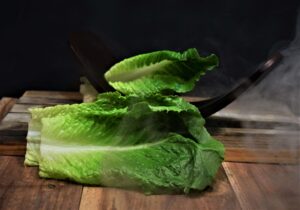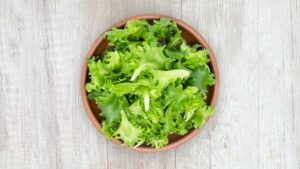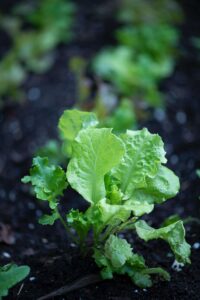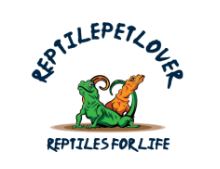Leopard geckos, with their striking patterns and captivating eyes, have become increasingly popular as pets among reptile enthusiasts. As such, the question, “can leopard geckos eat lettuce?” has become common.
So, can leopard geckos eat lettuce? The fact is that leopard geckos should not be fed lettuce as a primary or staple part of their diet. Lettuce lacks significant nutritional value for these reptiles and does not meet their specific dietary requirements. Leopard geckos are insectivorous by nature, and their bodies are adapted to digest and derive nutrients from a diet primarily consisting of insects. Lettuce mainly provides water and dietary fiber, which do not provide the essential proteins, fats, and vitamins that leopard geckos need for optimal health.
Addressing the Belief That Leopard Geckos Can Eat Lettuce
Lettuce is often mistaken as a suitable food option for leopard geckos, but in reality, it lacks significant nutritional value for these reptiles. As mentioned earlier, lettuce primarily consists of water and has minimal amounts of essential nutrients that leopard geckos require for proper growth and health. While it may not pose an immediate threat if offered occasionally in small quantities, it should not be a staple food in their diet.
Leopard geckos have evolved as insectivores, meaning their bodies are adapted to digest and derive nutrients from a diet primarily consisting of insects. In contrast, lettuce lacks the essential proteins, fats, and vitamins that leopard geckos need to thrive. It mainly provides water and dietary fiber, which do not contribute significantly to their nutritional requirements. Feeding lettuce alone can lead to nutrient deficiencies and overall poor health in leopard geckos.
Why You should not Feed Lettuce to Leopard Geckos
To fully grasp the potential risks associated with feeding lettuce to leopard geckos, it’s important to understand their unique digestive system. Leopard geckos possess a relatively simple digestive tract designed specifically for processing the high-protein, low-fiber diets of insects. Their digestive system is optimized for breaking down and absorbing nutrients from these prey items efficiently.
Lettuce, on the other hand, contains a significant amount of fiber that leopard geckos are not equipped to handle effectively. The fibrous nature of lettuce can pose challenges to their digestive system, as it is not easily broken down and digested by these reptiles. Unlike humans, leopard geckos lack the necessary enzymes to efficiently process and extract nutrients from plant matter like lettuce.
Feeding lettuce to leopard geckos can lead to several potential negative effects on their health. The high fiber content in lettuce can cause digestive disturbances, such as bloating, gas, or even impaction. Impaction occurs when undigested plant matter accumulates in the digestive tract, potentially leading to serious blockages and discomfort for the gecko. Moreover, the limited nutritional value of lettuce can contribute to nutritional deficiencies in leopard geckos, as it does not provide the essential proteins and calcium they need for optimal growth and development.

Potential Risks and Health Issues Associated With Feeding Lettuce
Feeding lettuce to leopard geckos can potentially lead to several health issues. The high water content in lettuce can result in loose stool or diarrhea in leopard geckos, which may lead to dehydration. Moreover, the lack of necessary nutrients can weaken their immune system, making them more susceptible to diseases. Prolonged consumption of lettuce as a staple food can even lead to malnutrition, stunted growth, and metabolic bone disease.
Myths and Misconceptions Related To Leopard Gecko’s Diet
In addition to the misconception about lettuce, there are several other foods that should be avoided when it comes to feeding leopard geckos. These include:
- Insects caught in the wild: While it may seem natural to feed wild-caught insects to leopard geckos, it is risky due to potential pesticide exposure and the risk of introducing parasites or diseases. It is safer to purchase commercially bred and gut-loaded insects specifically intended for reptile consumption.
- Citrus fruits and acidic foods: Citrus fruits such as oranges, lemons, or grapefruits, along with other acidic foods, should be avoided as they can cause digestive upset and irritation in leopard geckos. Their digestive systems are not adapted to handle high acidity levels.
- Toxic or potentially harmful insects: Certain insects like fireflies or toxic beetles should never be fed to leopard geckos. These insects produce toxins that can be lethal to reptiles. It is crucial to research and ensure the insects offered are safe and suitable for leopard geckos.

Appropriate Vegetables and Fruits for Occasional Treats
While leopard geckos primarily require a diet consisting of insects, there are a few vegetables and fruits that can be offered as occasional treats to add variety to their diet. These treats should be provided in small amounts and should not replace the main insect-based diet. Some safe options include:
- Squash: Butternut squash or acorn squash can be offered as a treat. They are rich in vitamins and minerals, including vitamin A, which is beneficial for leopard geckos.
- Carrots: Carrots are another occasional treat that can be provided. They are a good source of beta-carotene and vitamin A. Ensure the carrots are grated or finely chopped to aid digestion.
- Papaya: This tropical fruit is a great choice for an occasional treat. It contains enzymes that aid in digestion and provides vitamins and minerals.
Remember to cut all fruits and vegetables into small, bite-sized pieces that are easy for the geckos to consume.
Gut-Loading Insects for Nutritional Benefits
One crucial aspect of providing a nutritious diet for leopard geckos is ensuring the insects they consume are properly gut-loaded. Gut-loading refers to feeding the insects a nutritious diet before offering them to the geckos. This process ensures that the insects themselves become a source of essential nutrients. High-quality insect feed, such as commercial gut-loading diets or fresh vegetables and fruits, can be used to enhance the nutritional value of the insects.
By gut-loading insects, leopard geckos receive additional vitamins, minerals, and other essential nutrients indirectly, leading to a more balanced and nutritious diet overall. It’s essential to ensure the insects have been adequately gut-loaded before feeding them to the geckos to maximize their nutritional benefits.
Alternative Leafy Greens or Vegetables That Can Be Offered to Leopard Geckos
While lettuce may not be suitable for leopard geckos, there are alternative leafy greens and vegetables that can be offered occasionally. These options provide more nutritional value and can add variety to their diet. Some safe alternatives include:
- Dandelion greens: Dandelion greens are highly nutritious and rich in calcium. They can be offered as a treat, but ensure they are sourced from pesticide-free areas.
- Mustard greens: Mustard greens are packed with essential vitamins and minerals, including calcium and vitamin A. They make a great addition to the occasional vegetable treats.
- Turnip greens: Turnip greens are another excellent option. They offer a variety of nutrients, including calcium, vitamin C, and vitamin A.

Frequently Asked Questions
Can leopard geckos eat lettuce?
Answer: No, leopard geckos should not eat lettuce. Lettuce lacks the necessary nutrients for their health and does not meet their dietary requirements. Feeding lettuce as a staple food can lead to nutrient deficiencies and digestive issues in leopard geckos.
What should I feed my leopard gecko instead of lettuce?
Answer: Leopard geckos require a diet primarily consisting of insects. Provide them with a variety of appropriately-sized insects, such as crickets, mealworms, and dubia roaches. Additionally, you can offer occasional treats of suitable vegetables and fruits, like squash, carrots, or papaya.
Are there any risks in feeding lettuce to leopard geckos?
Answer: Feeding lettuce to leopard geckos can pose several risks. The high water content in lettuce can lead to loose stool or diarrhea, potentially causing dehydration. Moreover, the lack of essential nutrients in lettuce can weaken their immune system and result in malnutrition or metabolic bone disease.
Can I give my leopard gecko other types of leafy greens?
Answer: While lettuce is not recommended, there are alternative leafy greens that can be offered to leopard geckos occasionally. Dandelion greens, mustard greens, and turnip greens are some examples that provide more nutritional value. Remember to finely chop these greens and offer them in moderation.
What other foods should I avoid feeding my leopard gecko?
Answer: In addition to lettuce, avoid feeding your leopard gecko wild-caught insects, as they may carry pesticides or parasites. Citrus fruits and acidic foods should also be avoided due to potential digestive upset. Additionally, never feed them toxic insects like fireflies or beetles, as these can be lethal to reptiles.
Conclusion
While leopard geckos may captivate reptile enthusiasts with their unique beauty and charming demeanor, it is crucial to understand and meet their specific dietary requirements. Lettuce, despite being a common misconception, lacks the necessary nutrients for these insectivorous creatures and should not be a staple food in their diet.
